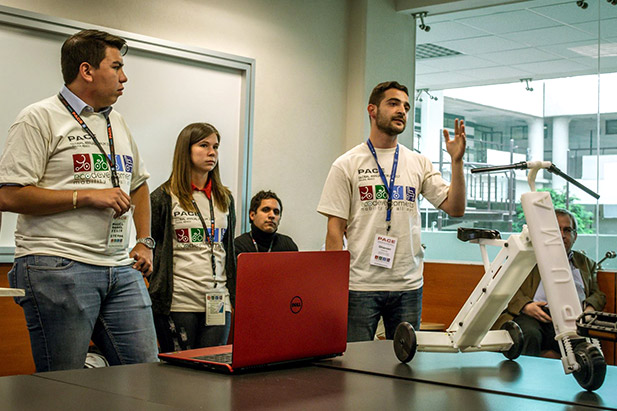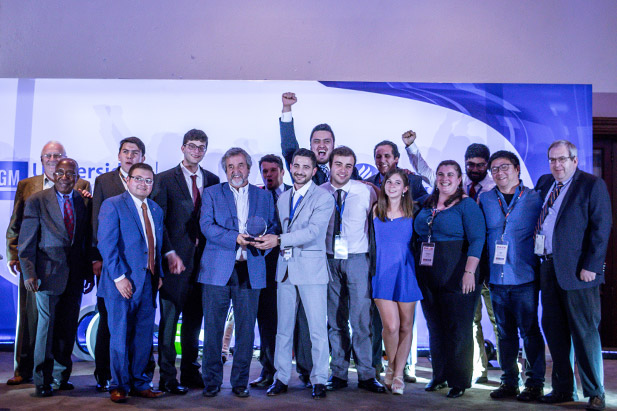Engineering students help set the PACE on personal urban transportation
Fifth straight year of recognition at global student engineering competition
October 20, 2017

One of the greatest opportunities of the student learning experience at the University of Ontario Institute of Technology is the chance to apply lessons from the lab and lecture hall toward a real-world project or challenge.
Faculty of Engineering and Applied Science (FEAS) Mechanical Engineering students Ghassan Chehade and Amir Karim rolled up their sleeves this summer to represent the university on the international stage at the Partners for the Advancement of Collaborative Engineering (PACE) Education competition in Toluca, Mexico.
Chehade, Karim and 10 other 2017 FEAS graduates* helped design of a Personal Urban Mobility and Accessibility (PUMA) device: a portable, self-powered assisted vehicle that can be taken on a train, bus or any larger vehicle. Mixing public transportation with personal urban transportation, PUMAs are designed as foldable electric tricycles that can be stowed or carried indoors.

The university’s ‘Lacus’ design concept PUMA project earned third-place honours at PACE 2017 in the categories of Customer Insight as well as Design for Manufacturing.
PACE 2017 offers students an international experience where they can see how a project is developed in the real world, while tackling objectives and tasks in a collaborative environment. University of Ontario Institute of Technology students worked with counterparts from seven other universities in four countries:
- Howard University (Washington, D.C.)
- Instituto Tecnológico y de Estudios Superiores de Monterrey (ITESM) Campus Estado de Mexico (Mexico City, Mexico)
- ITESM-Campus Monterrey (Monterrey, Mexico)
- McMaster University (Hamilton, Ontario)
- National Institute of Design (Ahmedabad, India)
- Shanghai Jiaotong University (Shanghai, China)
- Virginia Tech (Blacksburg, Virginia)
FEAS faculty members Atef Mohany, PhD, Associate Professor, and Yuelei Yang, PhD, Senior Lecturer, supervised the students.
*Other team members from the Mechanical Engineering, Automotive Engineering and Manufacturing Engineering programs:
- Eunsik Bae
- Kyle Bechmann
- Nicholas Bruno
- Shae Contois
- Melissa Fracz
- Sabari Girish
- Aba Hanukaev
- Jesse Sicard
- Ali Soliman
- Bradlei Taylor
Advantages of a PUMA device
By 2030, more than 60 per cent of the world’s eight billion people will live in urban areas, creating tremendous pressures in the form of pollution, congestion, energy, security and traffic safety. With public infrastructure struggling to meet the growing demand for transportation and basic services, cities will be so dense that traditional car and private vehicle ownership will not be sustainable. Cities, transportation and automotive industries currently seek smart mobility solutions to these global challenges.
PUMAs are a key component in the concept of ‘first mile/last mile transport’: seamlessly integrated vehicle systems to help commuters safely complete their trip to work or to school, from home and back, to reduce congestion and pollution in large cities. The accessibility features of PUMAs will help address safety issues in areas of high population density. PUMA designs are battery powered and typically rechargeable in under 30 minutes.
Student quotes
“The experiences, connections and memories made at the PACE Global Forum 2017 were irreplaceable and provided a great learning experience outside the classroom. The competition was fierce, and every team worked hard to present their own unique personal mobility solutions. Our team came together with strong collaboration, and dedication to successfully design, develop and present our concepts.”
-Amir Karim, Mechanical Engineering, class of 2017
“Taking part in the PACE global competition in my final year was by far the best experience of my undergraduate degree. It was not easy, but all of our efforts paid off. We took the PUMA project from bottom to top, won two awards and represented our country and university. More importantly, this project taught me how to connect with people and how to transfer and apply knowledge I gained in my program.”
-Ghasson Chehade, Mechanical Engineering, class of 2017
Faculty supervisor quotes
“Engineering students from the University of Ontario Institute of Technology have always demonstrated great enterprise and innovation at PACE competitions over the years as evident by the numerous awards and recognition achieved at such events. This is a testament to the effort and hard work put forth by the students, and to the knowledge gained from our outstanding programs.”
-Atef Mohany, PhD, Associate Professor, Faculty of Engineering and Applied Science
“The Faculty of Engineering and Applied Science is extremely proud of the achievement of Ghasson and Amir in Mexico. We are thrilled about the outcome of their experiential learning opportunity at the University of Ontario Institute of Technology.”
-Yuelei Yang, PhD, Senior Lecturer, Faculty of Engineering and Applied Science
List of University of Ontario Institute of Technology’s PACE Global Forum awards:
- 2017 (Toluca, Mexico): Customer Insight (3rd); Design for Manufacturing (3rd)
- 2016 (Cincinnati, Ohio, USA): Customer Insight (1st)
- 2015 (São Paulo, Brazil): Customer Insight (2nd); Product Engineering (3rd)
- 2014 (Torino, Italy): Market Research (3rd)
- 2013 (Pasadena, California, USA): Market Research (2nd); Ready for Production (3rd)
About PACE
Founded in 1999, PACE (Partners for the Advancement of Collaborative Engineering Education) has grown to an organization of 65 engineering and design universities, and 23 key business partners from 12 different countries. The University of Ontario Institute of Technology is one of seven universities in Canada with PACE membership.
The PACE program provides students with a high level of experiential learning. The exposure to these challenges, dynamics of collaboration, and pressure of delivering viable solutions to given real-world problems is invaluable to the development of these students as they prepare for the industry in a global marketplace. The PACE program has been foundational in raising the bar for design and engineering education globally.



